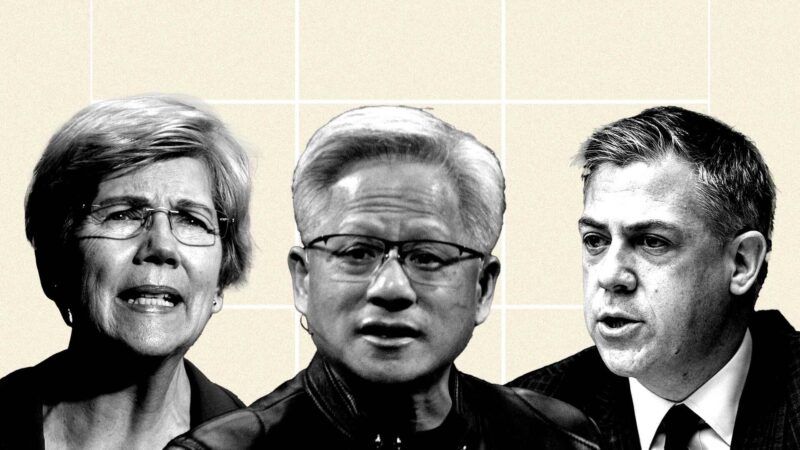Elizabeth Warren and Jim Banks Attack Nvidia for Expanding Its Chinese Facility
Complying with export regulations should build trust between Nvidia and Congress, not erode it.

Sens. Elizabeth Warren (D–Mass.) and Jim Banks (R–Ind.) sent a letter to Nvidia CEO Jensen Huang on May 29 about a facility the company is making in Shanghai. The senators expressed concerns about Nvidia advancing Chinese AI development that may pose a threat to the U.S. and enjoined the company's recent decision as "helping the [People's Republic of China] build cutting-edge semiconductor capacity." While the senators make it sound like Nvidia and the Chinese government are in cahoots to establish a global chipmaking monopoly, that's not what's happening at the company's Shanghai site.
Financial Times reports that "the R&D centre would research the specific demands of Chinese customers and the complex technical requirements needed to satisfy Washington's curbs" on chip exports. The Bureau of Industry and Security (BIS) first issued AI chip export controls in October 2022 "to limit the PRC's ability to obtain advanced computing chips or further develop AI and 'supercomputer' capabilities for uses that are contrary to U.S. national security and foreign policy interests."
The senators claim that Nvidia "risks violating the spirit…of U.S. export control regulations" and "will erode trust between [Nvidia] and the U.S. Congress." They do not explain how dedicating more manpower to complying with stringent U.S. export regulations is evidence of noncompliance.
The senators also say that Nvidia's expansion of its Shanghai office "fits within a pattern of behavior that demonstrates a disregard for U.S. national security." However, their cited evidence of the company's malfeasance—an April letter sent by the BIS forbidding the unlicensed export of Nvidia's H20 chip to China—doesn't support this claim; Nvidia immediately halted sales of the chip after receiving the letter and incurred a $4.5 billion loss as a result. (The very existence of the H20, a paired-back version of the H100 that was created to adhere to BIS' export controls to China, is evidence of compliance with federal regulations.)
The letter requires Nvidia to satisfy a list of demands by June 20, including: a description of the company's plans for the facility; how the company will prevent the transfer of Nvidia technology and talent; and a leading question asking the company to explain why it "would choose to enrich an authoritarian country's innovation ecosystem by establishing a research center in the PRC rather than conducting this research at facilities located in the United States." (Nvidia announced in April that it will manufacture up to half a trillion dollars of advanced AI chips and supercomputers in the U.S. through collaborations with TSMC, Foxconn, and Wistron.)
The senators are right to prioritize national security, but they fail to appreciate how depriving Nvidia of the Chinese market jeopardizes American AI leadership instead of protecting it.
Calling into question the patriotism of Jensen Huang, whose company has obeyed BIS export controls, does not advance American security. American export controls failed to prevent Chinese firm DeepSeek from releasing an advanced reasoning model comparable to OpenAI's o1 model just this January.
Warren and Banks don't want Nvidia to do business in China. But pulling out of the Chinese AI market entirely would encourage China to become self-sufficient instead of reliant on U.S. technology. This would harm the American economy and imperil national security—the opposite of the senators' stated goals.


Show Comments (12)